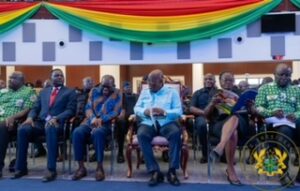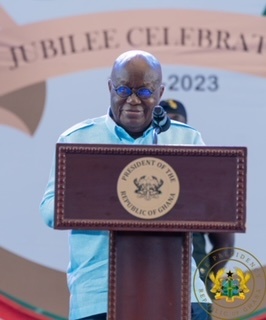President Akufo-Addo says the comprehensive transformation agenda being embarked upon by the National Service Scheme – and which is tied to the new strategic direction of other pro-youth agencies – is addressing the specific employment needs of young people.
This youth-driven transformation agenda, according to him, relates primarily to training and skills development, and provision of pre-employment support activities as well as instilling the values of civic responsibility, discipline, nationalism and volunteerism.
To this end, the president stated that: “Several youth development programmes have been put in place which not only prioritise young adults’ needs and build the skills needed to become productive and successful members of society, but also strengthen young people’s sense of identity and belief in the future”.

President Akufo-Addo made this known on Tuesday 10th October 2023, at the launch of activities to commemorate the National Service Scheme’s Golden Jubilee anniversary at the University of Professional Studies auditorium, Accra.
Citing the National Entrepreneurship and Innovation Programme (NEIP), Ghana Enterprises Agency’s (GEA) YouStart Programme and the Commission for Technical and Vocational Educational and Training (CTVET), he said: “My government since 2017 has engaged young people, including National Service Personnel, in intentional, productive and constructive ways while recognising and enhancing their strengths”.
Under the Economic Enclave Programme, for example, President Akufo-Addo noted that the NSS will in the next four years – in the agriculture sector – deploy 65,000 graduate youths to the Agricultural Enclaves, create 81,000 jobs in agriculture and its allied sectors, and develop 20,000 hectares of land for production – and in addition, the production of 110,000 metric tonnes of food and production of 1.5 million birds.
This, he said, will consequently result in generating revenue of some US$92million by year-four.

Further, President Akufo-Addo told the gathering that for the first time in its existence, the NSS will lay a Draft Policy document before parliament that will transition the Scheme’s status to an Authority – thus providing a legal framework for the envisioned ‘Deployment for Employment’ (D4E) model that is designed to encourage young graduates to create a positive impact and contribute in the development of our nation.
On the necessity for NSS support to the education and health sectors, as well as Graduate/Youth in Agriculture, as a means toward import substitution and addressing food security challenges, the president urged the Scheme to scale-up and “focus on the new modules that it has initiated, with the purposive intention that the capabilities of these energetic and educated youth will be deployed to generate maximum impact for the country’s socio-economic development goals”.
The president, in his address, paid glowing homage to the Members of Parliament who deliberated on the draft NSS bill that culminated in the passage of Act 426. They include the late statesmen, J. H. Mensah, A. A. Munufie, Peter Ala Adjetey, Harry Sawyerr and Kwaku Baah, among others.
“I recount the words of the then Member of Parliament for Atwima Nwabiagya, Hon. John Agyekum Kufuor, subsequently the 2nd President of the 4th Republic, who intimated during the debate on processes leading to the passage of Act 426 in 1980 that “the Scheme is a vehicle for building national cohesion”. He again posited that: “We should look at the Scheme as a development of human resources. We are going to make our future manpower more prepared to be used more efficiently”, he told the gathering.










